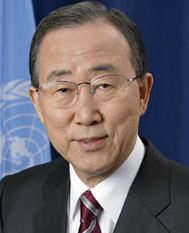“We begin 2016 needing to get our priorities right,” said UN Secretary-General Ban Ki-moon in an informal briefing to the UN General Assembly (UNGA).
He noted the heavy responsibility resting on “Year One” of the UN's new development agenda, the 2030 Agenda for Sustainable Development.
This is also the last year of Ban's tenure as Secretary-General.
 14 January 2016: “We begin 2016 needing to get our priorities right,” said UN Secretary-General Ban Ki-moon in an informal briefing to the UN General Assembly (UNGA). He noted the heavy responsibility resting on “Year One” of the UN’s new development agenda, the 2030 Agenda for Sustainable Development. This is also the last year of Ban’s tenure as Secretary-General.
14 January 2016: “We begin 2016 needing to get our priorities right,” said UN Secretary-General Ban Ki-moon in an informal briefing to the UN General Assembly (UNGA). He noted the heavy responsibility resting on “Year One” of the UN’s new development agenda, the 2030 Agenda for Sustainable Development. This is also the last year of Ban’s tenure as Secretary-General.
Addressing Member States in New York, US, on 14 January 2016, Ban highlighted the “towering achievements” of adopting the 2030 Agenda and the Paris Agreement on Climate Change, as well as the Sendai Framework on Disaster Risk Reduction (DRR), the Addis Ababa Action Agenda (AAAA) on financing for development, and progress against polio and Ebola.
On the direction of work in 2016, Ban said the Sustainable Development Goals (SDGs) must find national traction, with all governments aligning policies, legislation and resources to support the Goals. He stressed that the Agenda applies to even the wealthiest countries. Ban also raised the importance of gender equality for the Agenda, observing the lack of women at “too many parliaments, ministries, cabinets, board rooms and peace processes.”
Among other forthcoming initiatives and events, Ban highlighted the first-ever UN system-wide Global Initiative on Decent Jobs for Youth. He also said the UN system will continue to mobilize civil society to play its crucial role.
Ban cited climate action as central to implementing the 2030 Agenda, essential for achieving the SDGs, and beneficial for the economy. He noted the high-level signing ceremony for the Paris Agreement that he will host on 22 April 2016, adding that he will spare no effort to ensure its early entry into force.
Ban’s other focus in the briefing was on ending conflicts, which he said would be aided by – and reinforce – the SDGs. Ban reported that his peace operations initiative aims to strengthen UN peace and security tools, and he emphasized the role of conflict prevention, including through the Human Rights up Front initiative and the norm of Responsibility to Protect. In countering violent extremism, Ban said the challenge is to defeat Da-esh, Boko Haram and other such groups “without defeating ourselves…. Human rights must be at the forefront of our response.”
Highlighting developments in Syria and humanitarian workers’ arrival in the town of Madaya, Ban said “the use of food as a weapon of war is a crime,” and stressed that all sides are committing acts prohibited under international humanitarian law. Ban asked Member States to think of those left behind to suffer in a renewed siege, and people isolated elsewhere in Syria. He called for “immediate, unconditional and unimpeded humanitarian access,” and for accountability for those responsible, adding that “their regional and international patrons also have much to answer for.” Elaborating on this point in press remarks following the briefing, Ban said the use of starvation as a weapon of war is a “war crime.” He added that “along with food, the people we have encountered want answers. Who cares about our lives? Where is the international community? Who will speak for us?” He said it is up to the Security Council to take necessary action on these war crimes.
Further on humanitarian issues, Ban described 2016 as “a time of massive humanitarian need” and highlighted the launch of the High-level Panel on Humanitarian Financing later in the week in Dubai, a Syria pledging conference in London on 4 February, a Resettlement Plus conference in Geneva on 30 March, the first-ever World Humanitarian Summit on 23-24 May in Istanbul, and the High-level meeting on addressing large-scale movements of refugees and migrants, on 19 September 2016. He looked forward to “a new global compact on human mobility” resulting from these discussions and processes.
Ban concluded his briefing with a call to leave no one behind and to “put the last first.” Recalling his oath of office nine years ago, he said, “Our place must be with the boy fleeing conflict, the girl denied a seat in the classroom, and the children still at risk of dying of preventable causes before their fifth birthday. We must stand with women and men facing daily discrimination, and with millions still living in extreme poverty.” [UN Secretary-General’s Briefing] [UN Press Release] [Webcast] [Remarks to Press]